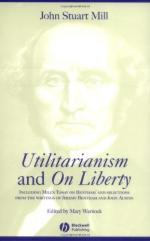|
This section contains 7,999 words (approx. 27 pages at 300 words per page) |

|
SOURCE: “The Greatest Happiness Principle,” in Jeremy Bentham and Representative Democracy: A Study of the ‘Constitutional Code,’ Clarendon Press, 1983, pp. 200-20.
In the following essay, Rosen analyzes Jeremy Bentham's greatest happiness principle, focusing particularly on the related ideal of equality.
There is no necessary connection between utilitarianism and democracy. Many democrats have not been utilitarians and many utilitarians (including Bentham himself during a considerable portion of his life) have not been democrats. Nevertheless, the democratic principles of the Constitutional Code rest on a utilitarian foundation, and this study of Bentham's theory of democracy would be incomplete without an examination of it. In this [essay] we shall be concerned with the meaning and significance of the greatest happiness principle as it appears in the Code and in related writings.
 Jeremy Bentham (1748–1832)
Jeremy Bentham (1748–1832)Bentham formulates the greatest happiness principle in chapter II of the Code as follows:
Of this constitution, the...
|
This section contains 7,999 words (approx. 27 pages at 300 words per page) |

|


